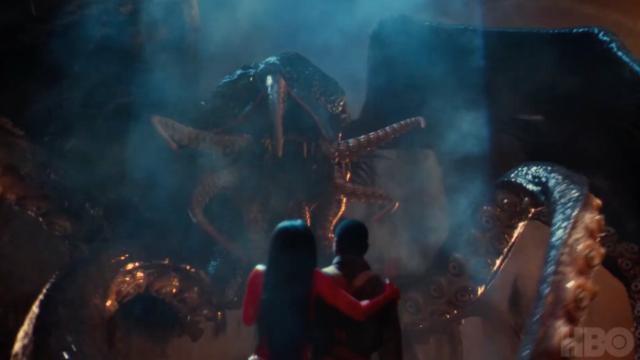Like all horror that wants to leave you feeling unsettled and disturbed long after you’ve finished watching it, Lovecraft Country’s first episode is careful to take its time and make you wait almost until the very end for the series’ supernatural monstrosities to make themselves known. If anything, the demons hunting Atticus, Leti, and George come to them almost like an epiphany in the middle of a larger, complicated process of making sense of the world around them and trying to find their place in it.
Discovering that the creatures that stalk the pages of their sci-fi and fantasy books are, in fact, real immediately changes the worldviews of Lovecraft Country’s heroes. It establishes that they’ve walked into a new kind of danger distinct from, but perhaps not wholly unrelated to, the garden variety (but still oftentimes deadly) racism they face on a day-to-day basis. Much as Lovecraft Country’s about people banding together to fend off the otherworldly evils that lurk in the shadows, showrunner Misha Green has emphasised that, at its core, the series is really about the various members of the Freeman family working through deep-seated, emotional complexities that have caused them pain in a variety of ways.
When we sat down with Green recently, she explained how, during Lovecraft Country’s production process, she kept coming back to the fact that the story truly does revolve around the concept of a family trying to heal both as individuals and as a unit.
“What we talked about a lot was [that] the show at the end of the day is just a family drama,” Green said. “And what is it about these people in this family, and what secrets and shame do they have to unpack and exorcise to come together to reclaim their legacy?”
Within moments of returning to their respective families on the South Side of Chicago, both Leti and Atticus’ excitement to see their relatives is shot through with long-held frustrations and anger that were clearly left unresolved before they’d left. The specific details of what caused the rift between Atticus and his emotionally distant father are left unclear, but you can see in the way that Atticus has a powerful bond with his uncle George that George was both able to act as a stable father figure for his nephew and to sustain something of a stable relationship with his brother, who he does genuinely care for, arsehole though he may be.
Though Letitia’s well-known and loved by essentially everyone in the neighbourhood, her sister Ruby’s contempt is palpable and multifaceted. Beyond the fact that Leti’s always had a habit of prioritising her own desires, the fact that their late mother — whose funeral Leti missed — never seemed to put up much of a fuss about it weighs heavily on Ruby’s heart. In many ways, she felt as if she had to be the “responsible” sibling Leti never was. On the topic of Ruby applying for a job at a local department store, Ruby’s of the firm mind that her being Black would make it impossible for her to snag the interview. Leti, though, figures that Ruby’s got nothing to lose and she’ll guarantee herself out of the position if she doesn’t even try to get it, and Ruby interprets her sister’s perspective as yet another example of her not understanding how the world works and how things aren’t as easy for everyone.
Mundane as Leti and Ruby’s disagreements might initially seem, it’s actually reflective of one of the larger ideas Green wanted to shape Lovecraft Country as it pulled its characters out of their comfort zones and into an unfamiliar, magical space. Both women are committed to their own ideas about what it means to endure and thrive, but what they don’t know is how much those ideas are going to be put to the test as the season progresses.
“For me, a theme that’s always circling around in my head — which is why I love the horror genre — is what we’re ready to do for metaphorical and physical survival,” Green said. “And I think that that is an exploration for every character. How far are you willing to go to stake your claim in your legacy and who you are as a person and say, ‘I’m worthy to be here?’”
In the premiere’s final moments — as Atticus, Leti, George, and the squad of racist cops preparing to murder them are ambushed in the forest by a pack of flesh and blood shoggoths — Lovecraft Country lives up to its namesake and veers straight into shit-your-pants-and-run territory. There’s going to plenty more of that as the season goes on, but Green very pointedly restated that the scariest parts of the show exist within the characters’ dynamics. This was something she made certain the entire Lovecraft Country writers’ room knew going into the project, and it’s something we should all bear in mind while watching.
“I said, you know, to every writer that came in, I was like, ‘Get prepared for therapy,’” Green recounted. “I was like, ‘It’s going to be icky, we’re going to feel icky.’ We’re gonna be like, ‘Ugh, we don’t want to go there,’ but I feel like it’s important, too, because that’s when you’re sharing something — saying that we’re not alone. We’re all fucking crazy in our own little heads, and that doesn’t mean we don’t get to stand and be counted.”
Lovecraft Country airs on Binge in Australia.
